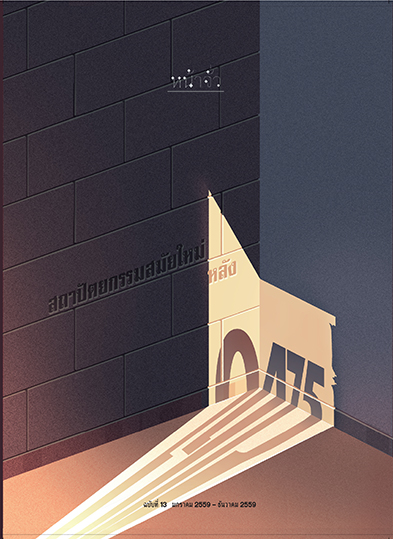สถาปนิก ความรู้ โรงเรียนสถาปัตยกรรม/ Architect, Knowledges, and Architecture Schools
Main Article Content
Abstract
บทคัดย่อ
บทความชิ้นนี้มีเป้าหมายเพื่อศึกษากำเนิดโรงเรียนสถาปัตยกรรมในสังคมไทย วิเคราะห์หลักสูตรการเรียนการสอน ตลอดจนการสร้างความรู้ในวิชาสถาปัตยกรรมในช่วงระหว่างทศวรรษ 2450 มาจนถึงราวทศวรรษ 2500 โดยมีกรอบแนวคิดหลักในการศึกษาคือ การพิจารณากำเนิดโรงเรียนสถาปัตยกรรมในฐานะ “ทุนทางวัฒนธรรม” (Cultural Capital) ตามกรอบแนวคิดของ ปิแอร์ บูดิเยอ (Pierre Bourdieu) ซึ่งผลการศึกษาชี้ให้เห็นว่า ประวัติศาสตร์ของโรงเรียนสถาปัตยกรรมคือประวัติศาสตร์ของการแบ่งช่วงชั้นทางสังคมผ่านกำเนิดของวิชาชีพสมัยใหม่ที่เรียกว่าสถาปนิก โรงเรียนสถาปัตยกรรมและใบปริญญาบัตรได้กลายเป็นทุนทางวัฒนธรรมให้แก่สถาปนิกในการเก็บเกี่ยวผลประโยชน์ต่าง ๆ และได้มาซึ่งสถานะทางสังคมภายใต้โครงสร้างความสัมพันธ์เชิงอำนาจในสังคมสมัยใหม่ โดยอาศัยการกำหนดนิยามความรู้ทางสถาปัตยกรรมว่าคืออะไร และใครบ้างมีสิทธิที่จะเป็นสถาปนิก นิยามของสถาปนิกคือบุคคลที่มีความคิดสร้างสรรค์ และนิยามวิชาสถาปัตยกรรมว่าคือผลรวมของศาสตร์ที่ผสมผสานความเป็นวิทยาศาสตร์และศิลปะเข้าด้วยกัน นิยามเหล่านี้ได้ทำให้สถาปนิกกลายเป็นบุคคลที่มีสถานะสูงทางสังคมโดยมีใบปริญญาเป็นเครื่องหมายแสดงสถานะ อย่างไรก็ตามความรู้ทางสถาปัตยกรรมจะต้องถูกกำกับเอาไว้ด้วย “ความเป็นไทย” เพื่อไม่ให้วิชาชีพนี้เข้าไปท้าทายโครงสร้างอำนาจของสังคมไทย ดังนั้นความรู้ทางสถาปัตยกรรมจะต้องถูกผลิตขึ้นบนฐานของการผสมผสานความรู้แบบช่าง ไทยโบราณเข้ากับวิธีการศึกษาตามมาตรฐานวิชาการสมัยใหม่แบบตะวันตก เพื่อให้สามารถคงสถานะของความเป็นไทยและความเป็นสมัยใหม่ในเวลาเดียวกัน ซึ่งความรู้แบบนี้เท่านั้นที่จะได้รับการยอมรับและมีสถานะของการเป็นทุนทางวัฒนธรรมที่มีมูลค่าสูงสุดในสนามการแข่งขันที่ชื่อว่าวงการสถาปัตยกรรมในสังคมไทย
Abstract
The paper aims to study the rise of architecture schools in Thailand during 1907-1957 A.D. Considering through Pierre Bourdieu's concept of cultural capital, the question is how architectural knowledge and its curriculum in Thailand had been constructed. The study suggests that the history of architecture school in Thailand was the history of social distinction through the rise of architectural profession. Architectural schools and architectural degrees had become a cultural capital for Thai architects using them as a tool for getting benefits and high status into the social structure of power relationships in modern Thai society, by defining what the architectural knowledge really was, and who held a right to become an architect? The definition of architect as a person with great creativity and of architecture as the result of merging art and science together had helped making architects to obtain a high social status, verified by architectural certificates. The knowledge of the architecture, however, had been controlled by the discourse of Thai-ness for preventing any challenge to social structures of power relationships in Thailand. For this reason, the knowledge of architecture has always been constructed through the process of blending Thai traditional artisan knowledge with modern western architectural knowledge, in order to maintain its two important aspects : Thai-ness and modernity, at the same time. Only this kind of knowledge was acknowledged and given the status of the highest value of cultural capital in a competitive field of architecture in Thai society.


